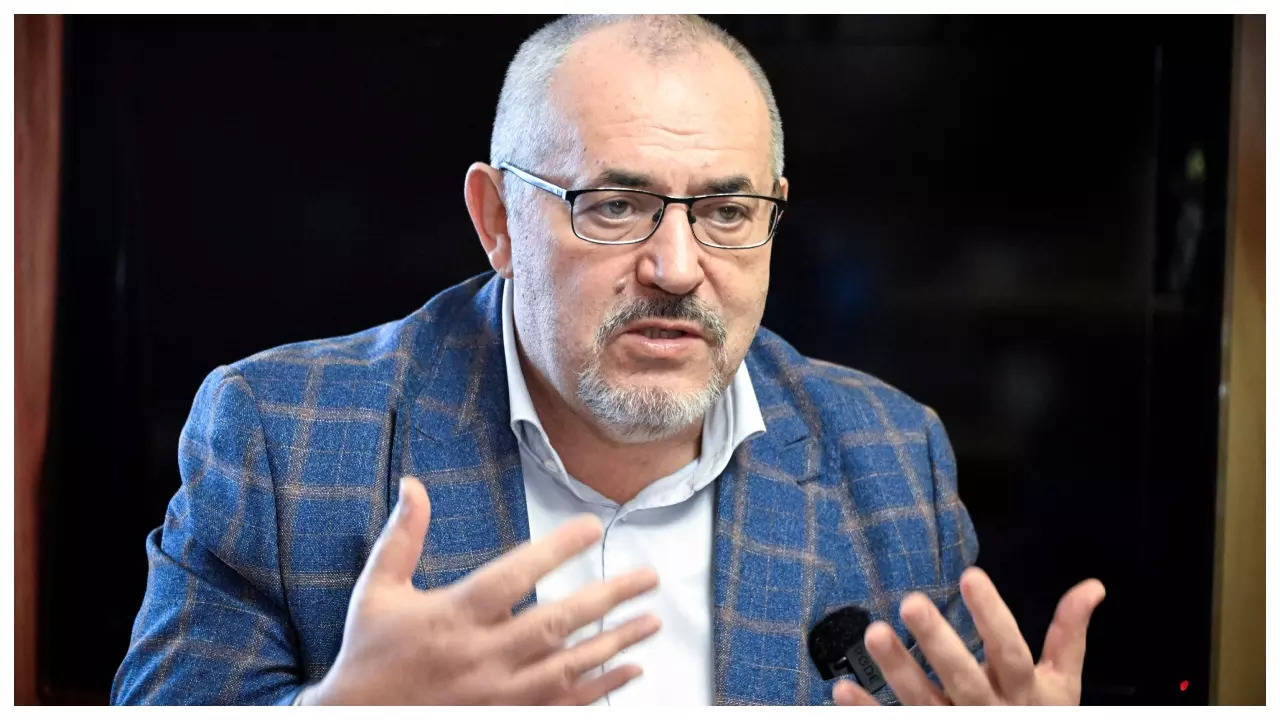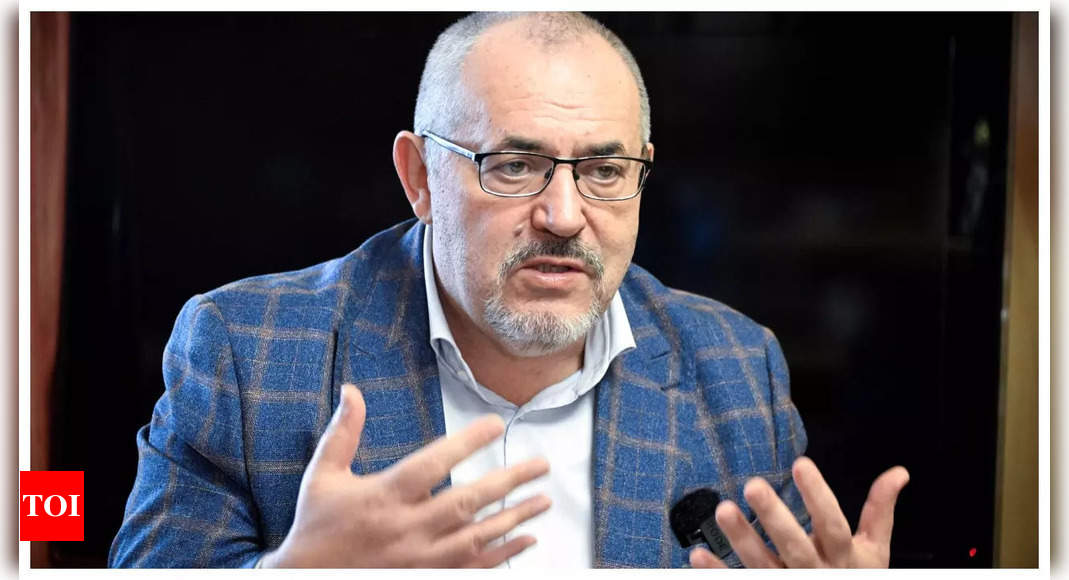
MOSCOW: Boris Nadezhdin, a local councillor in Russia, has shot to fame with promises to end the conflict in Ukraine if Russians select him over President Vladimir Putin in the March elections.
The 60-year-old’s calls to stop the intervention have brought out crowds of Russians across the country eager to add their signatures to his bid to get on the ballot.
But they have also highlighted the question of just how far the Kremlin will let him go, at a time when speaking out against the conflict is politically fraught.
In an interview with AFP, Nadezhdin — whose name shares a root with “nadezhda”, the Russian word for “hope” — described the conflict as “catastrophic” and said he wanted to “free political prisoners” in Russia.
On Wednesday, he must submit more than 100,000 signatures from supporters to electoral officials to be registered as a candidate.
When he met AFP in his modest apartment outside Moscow, he acknowledged it was unlikely he would be allowed to challenge Putin or appear on state television.
“I assure you my support would grow” were he allowed a platform on state media, he said.
Putin has not allowed real electoral opposition in his 24-year rule and some candidates for the March vote have said they do not want to hinder the longtime leader.
Whether he will be allowed to run or not, Nadezhdin told AFP he hoped the ballot would be a turning point.
“I hope that March 17, while it may not be the end of the Putin era, will at least mark the beginning of the end.”
Once an ally of assassinated opposition politician Boris Nemtsov, Nadezhdin has said he did not expect such a “crazy wave” of support.
He said it was a sign that Russians want an end to the conflict.
“People understand that their lives and the safety of their families is threatened by what Putin is doing,” he said.
Similar pronouncements about the fighting in Ukraine have landed others in prison, leaving activists and analysts wondering how Nadezhdin’s campaign has lasted this long.
Another candidate critical of the offensive, Yekaterina Duntsova, was barred from running over alleged errors in her paperwork.
Nadezhdin believes he was let through because his candidacy came from an officially registered party — a conservative party called Civic Platform that has no seats in parliament.
He said he decided to run at the last minute after waiting for better known names, like Nobel Prize winner Dmitry Muratov or media guru Alexei Venediktov, to announce.
“No one else went forward,” he said.
Aside from winning over regular Russians, the opposition — mainly now in exile — have also thrown their support behind him.
The wife of imprisoned opposition politician Alexei Navalny — Yuliya Navalnaya — signed her name in support of Nadezhdin, in a symbolic photo posted by the jailed critic’s ally.
But, unlike Navalny, who is serving 19 years in prison, Nadezhdin has so far faced no criminal proceedings for his daring statements.
He explained this to AFP by saying he is a “known person” to Kremlin bureaucrats, having spent the last 30 years in Russian politics.
He rubbed shoulders with Putin in government meetings during the Russian leader’s first term in office.
He says the arrest in 2023 of oligarch Mikhail Khodorkovsky was the moment “things were not going right” under Putin.
Nadezhdin was born in Soviet-ruled Uzbekistan, to a Jewish mother who was a music teacher and a physicist father.
He followed his father’s footsteps by studying physics, before turning to law and then politics.
He has been a councillor in the town of Dolgoprudny outside Moscow, since the end of the Soviet Union.
Nadezhdin has worked in campaigns in all of Russia’s presidential elections since the days of Boris Yeltsin, who gave way to Putin.
He told AFP he believes that change should come through free and fair elections.
“All the other options — revolutions, whatever colour they are, or coups — are much worse.”
The 60-year-old’s calls to stop the intervention have brought out crowds of Russians across the country eager to add their signatures to his bid to get on the ballot.
But they have also highlighted the question of just how far the Kremlin will let him go, at a time when speaking out against the conflict is politically fraught.
In an interview with AFP, Nadezhdin — whose name shares a root with “nadezhda”, the Russian word for “hope” — described the conflict as “catastrophic” and said he wanted to “free political prisoners” in Russia.
On Wednesday, he must submit more than 100,000 signatures from supporters to electoral officials to be registered as a candidate.
When he met AFP in his modest apartment outside Moscow, he acknowledged it was unlikely he would be allowed to challenge Putin or appear on state television.
“I assure you my support would grow” were he allowed a platform on state media, he said.
Putin has not allowed real electoral opposition in his 24-year rule and some candidates for the March vote have said they do not want to hinder the longtime leader.
Whether he will be allowed to run or not, Nadezhdin told AFP he hoped the ballot would be a turning point.
“I hope that March 17, while it may not be the end of the Putin era, will at least mark the beginning of the end.”
Once an ally of assassinated opposition politician Boris Nemtsov, Nadezhdin has said he did not expect such a “crazy wave” of support.
He said it was a sign that Russians want an end to the conflict.
“People understand that their lives and the safety of their families is threatened by what Putin is doing,” he said.
Similar pronouncements about the fighting in Ukraine have landed others in prison, leaving activists and analysts wondering how Nadezhdin’s campaign has lasted this long.
Another candidate critical of the offensive, Yekaterina Duntsova, was barred from running over alleged errors in her paperwork.
Nadezhdin believes he was let through because his candidacy came from an officially registered party — a conservative party called Civic Platform that has no seats in parliament.
He said he decided to run at the last minute after waiting for better known names, like Nobel Prize winner Dmitry Muratov or media guru Alexei Venediktov, to announce.
“No one else went forward,” he said.
Aside from winning over regular Russians, the opposition — mainly now in exile — have also thrown their support behind him.
The wife of imprisoned opposition politician Alexei Navalny — Yuliya Navalnaya — signed her name in support of Nadezhdin, in a symbolic photo posted by the jailed critic’s ally.
But, unlike Navalny, who is serving 19 years in prison, Nadezhdin has so far faced no criminal proceedings for his daring statements.
He explained this to AFP by saying he is a “known person” to Kremlin bureaucrats, having spent the last 30 years in Russian politics.
He rubbed shoulders with Putin in government meetings during the Russian leader’s first term in office.
He says the arrest in 2023 of oligarch Mikhail Khodorkovsky was the moment “things were not going right” under Putin.
Nadezhdin was born in Soviet-ruled Uzbekistan, to a Jewish mother who was a music teacher and a physicist father.
He followed his father’s footsteps by studying physics, before turning to law and then politics.
He has been a councillor in the town of Dolgoprudny outside Moscow, since the end of the Soviet Union.
Nadezhdin has worked in campaigns in all of Russia’s presidential elections since the days of Boris Yeltsin, who gave way to Putin.
He told AFP he believes that change should come through free and fair elections.
“All the other options — revolutions, whatever colour they are, or coups — are much worse.”
Source link

